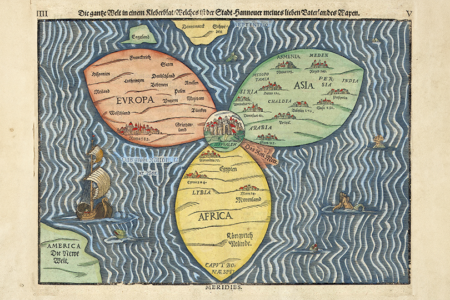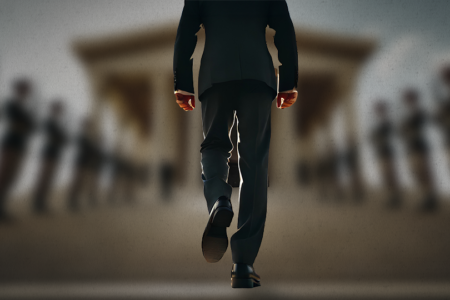Israel Comes of Age
On the eve of Israel’s twenty-first Independence Day, Tuesday, April 22nd the whole nation was in a solemn, but festive mood.
In spite of the almost daily skirmishes along the river Jordan and the Suez Canal, and the constant incursions into Israel of terrorist bands, the streets of Israeli cities from the Lebanese borders in the north to the Red Sea in the south were gaily beflagged and decorated. From time to time multi colored fireworks illumined the starry skies. Thousands of people crowded the sidewalks watching the passing parade.
School children, led by their teachers, marched down the streets to the beat of the drums, and the gay tunes of their bands. Laborers from farms and factories, delegations of Yemenite and Morrocan Jews, thousands of dancers and performers and Druze groups from villages on Mount Carmel, added much to the variety and color of the parade. The marchers played and sang some of the popular, modern songs of Israel and some ancient hymns, like Psalm 126: “Beshuv Adonai et Shivat Tsion.”
When the Lord turned again
The captivity of Zion
We were like them that dream. . . .
In striking contrast to last year’s Independence Day, when the victorious armed forces and their military gear occupied the center of public attention, this year there was not a soldier in sight, in keeping with Israel’s fervent desire for peace. The writer watched this particular parade from the balcony of a friendly Jewish family in Haifa, who invited us, complete strangers, into their home in a most gracious fashion.
The President of Israel and the other leaders of the nation in their public addresses emphasized the enormous strides which Israel has made since May 1948. The ravages of 19 centuries of neglect and devastation had to be rebuilt within a short time in the midst of constant harassment and wars. Israel had to pay a terrible price in blood and endless suffering for the right to live as a free people.
Behind all the festivities there was an undertone of somber reflection. It was joy mingled with tears: widows, parents, children, relatives, and close friends of those who laid down their lives in defense of Israel and of their homes, mourned their loved ones. The celebration had the dual character of Independence Day and Memorial Day. Tears of joy and sorrow mingled freely.
It should be remembered that Israel is a very small country inhabited by 2 1/2 million Jews and 1,300,000 Arabs. The death of one Jewish soldier has about the same effect on Israel as the loss of a hundred Americans killed in war. Within the past twenty years Israel has stood on the very brink of irretrievable disaster. One war lost and there would be no Israel. The gloom and the despair of two thousand years of exile and homelessness, would have had to continue unrelieved by the star of hope. But the God of Israel, who has watched over His people since its inception, did not permit this to happen. The Pharaohs, the Nebuchadnezzars, the Hamans, the Hitlers and the Stalins came and disappeared. Israel lives on, because God lives.
Reflecting upon Israel’s current troubles with her Arab neighbors, one is so forcefully reminded of a similar situation of the Jews in Israel some twenty-five centuries ago, after their return from the Babylonian exile under Ezra and Nehemiah.
But it came to pass, that when Sanballat, and Tobiah, and the Arabians, and the Ammonites, and the Ashodites, heard that the walls of Jerusalem were made up, and that the breaches began to be stopped, then they were very wroth, and conspired all of them together to come and to fight against Jerusalem and to hinder it. Nevertheless we made our prayer unto our God, and set a watch against them day and night, because of them.
And it came to pass from that time forth, that the half of my servants wrought in the work, and the other half of them held both the spears, the shields, and the bows, and the habergeons; and the rulers were behind all the house of Judah. They which builded on the wall, and they that bare burdens, with those that laded, every one with one of his hands wrought in the work, and with the other hand held a weapon. For the builders, every one had his own sword girded by his side, and so builded. And he that sounded the trumpet was by me.
Nehemiah 4:7-9, 16-18
Today, at the age of twenty one, Israel is a young sturdy nation, hardened in the never ceasing struggle for survival, and confident in her future. Yet her military prowess and her victories over her hostile neighbors pale, when compared to the mountainous obstacles which Israel had to overcome inside her borders in order to survive, and to grow.
Here was a scattered nation resurrected from the grave, after being considered dead for nearly two thousand years, in a land also dead for twenty centuries. A national resurrection of skeletons, which came out of the graves of concentration camps.
In 1948 there were only 650,000 Jews in Israel, in 1969 there are four times as many.
Most of the immigrants came poor and almost naked. All of these people had to be sheltered, fed, taught the language of their forefathers, Hebrew, and their children educated. Their land was barren and desolate, poor in natural resources. Everything they needed had to be imported from abroad, and few were the products which they could send abroad to pay for their imports.
Today they export textiles, agricultural products, minerals, diamonds, machinery which, together with the tourist trade, amounts to nearly one billion dollars a year, and pays for almost 80% of her imports.
Ancient cities were rebuilt and new ones added. The miserable tents and the ramshackle huts of the refugee camps which once dotted the whole landscape of Israel have now disappeared, although a serious housing problem still exists, especially for people of low income.
Thousands of new schools have been erected, from kindergartens to universities, from technical colleges to advanced institutes of research, which attract scholars and postgraduate students from many parts of the world.
Many of the underdeveloped nations send their bright young people to Israel to learn all the disciplines and skills needed in developing their own countries. All this is taking place amidst the constant threat of war, which forces Israel to spend the lion share of her national income for defense.
Is it any wonder that the popular saying has it: “He who in Israel does not believe in miracles, is not a realist.”
Israel’s Spiritual Condition Today
Among the many unresolved nationl problems, such as the hardcore poor and the unemployable, the chronically ill, and the threat of hostile invasion, one of the most pressing problems of Israel is how a modern people and a modern state can co-exist or even move forward when shackled by a religious tradition and a legal system which have their roots in antiquity. Is rabbinical Judaism compatible with a modern state and community? How can the ancient laws, as interpreted by the rabbis, be applied to the needs of a modern society? How can a modern state come to a dead halt one day every week, including a stoppage of water, electricity, and transportation?
Weddings, divorces, births and burials, questions of inheritances, and numerous other aspects of life are under rabbinical jurisdiction.
All this causes deep resentment and even rebellion among the people the majority of whom are not orthodox Jews, or even religious, in the traditional sense.
Rabbinical intolerance against those who differ from them in matters of faith, such as the Reform Jews, to say nothing of the small minority of Jewish Christians, is causing deep divisions and strife among the people. If it were not for the present political crisis, the religious rift might have by now caused open rebellion against rabbinical Judaism.
One of the darker aspects of Israeli life is the spirit of religious intolerance promoted and encouraged by the rabbinical authorities and their followers.
The same people who for centuries have protested against intolerance and discrimination in the lands of their dispersion, today practice the same things against their own minorities, especially the religious dissenters, mainly the Hebrew Christian. It is evident that centuries-old intolerance only breeds intolerance.
To confess his faith in Jesus, a Hebrew Christian in Israel needs unusual fortitude of character. His neighbors will call him “a mumar”—a traitor, or “meshumad”—apostate; he will be refused a job, or not given one commensurate with his qualifications. If he is a recently arrived immigrant, as soon as it is discovered that he is a Christian, he will be accused of coming to Israel under false pretences, having “pretended” to be a Jew while in reality he is a “goy.”
Unless he has a profession or skills which are in great demand in Israel, he will not be given a job. He and his family will be condemned to lifelong vegetation. His children will be called “goy” by the other children at school. Is it any wonder that some, in order to avoid persecution, seek to hide their faith, or leave Israel for more friendly shores?
For centuries the Jews have been victims of such acts of intolerance and persecution practiced against them by Gentiles, whom the Jews call “Christians.” This is known as “anti-Semitism,” or “Jew hatred,” but when Jews do the same thing against Jewish believers, what shall we call that? It can only be considered as a kind of anti-Semitism in reverse.
In March 1969 at the Jerusalem International Book fair, several Christian Publishing groups were represented by a united book-stall. This drew vehement protests and active opposition by the so-called Torah Activists, a group dedicated to fighting against Jewish believers and Christian missions. A few years ago these “Torah Activists” distinguished themselves by beating up a number of Jewish Christians, including a few women and children.
The Torah Activists were angry and claimed that the Meshumadim are using The Book Fair for their propaganda and to “trade with souls.” The aim of the missionaries, the Activists declared, is to destroy the people of Israel from within. They are a fifth column who sow mines with spiritual explosives.” (It should be pointed out that in the eyes of most Jewish people, every Hebrew Christian is considered “a missionary.”)
The man in charge of the Christian book-stall was interviewed by Kol Israel (the official radio broadcasting system) and asked whether it is true that they plant mines with spiritual explosives.
“No, here at the book fair I distribute catalogues. I just say, ‘Shalom, a catalog please.’ I don’t say anything else unless I am asked. When I am asked, I confine my answer strictly to the question.” This was confirmed by the people in charge of the stalls to the right and the left. The book fair management also examined the case and stated that there was no reason for any complaint.
Some Jewish publishers of religious books have refused to have their stalls next to that of the Dolphin (Hebrew Christian publishers), saying, “I would rather not take part in the book fair than be a neighbor of a Meshumad.” He went on: “It is true that my point of view is not democratic, but any point of view against missionaries and their propaganda is fair.” (This is reminiscent of the argument of the Nazis used against the Jews. Ed.)
Another encouraging aspect is the fact that the Word of God is being propagated by native born, Hebrew speaking young Jewish Christians. Today they are still a small group. They are not professional missionaries, but laymen who give gladly of their spare time, their energy, and their meager means for the cause of Christ.
Recently one young professional lady, a Jewish believer in Christ, was led to have Mrs. Buksbazen’s book “They Looked For A City” translated and published in Hebrew. The book was such a great blessing to her when she read it in English, and she believes that it will also be a powerful witness and blessing to Hebrew speaking Jews in Israel.
In calling the New Testament and other Christian literature “spiritual mines and spiritual explosives” as the Torah Activists do, they may not be far wrong. The New Testament is spiritual dynamite, but not for destruction, but for the building of a new and more abundant life.
“For I am not ashamed of the Gospel of Christ, for it is the power (dynamite) of God unto salvation to everyone who believes, to the Jew first and also to the Greek.” Romans 1:16..
Why is the opposition to witnessing Christianity so vehement? It seems to that there are three main factors responsible for this—
1) The memory of past suffering and humiliation inflicted upon the Jews through the centuries by so-called Christians, often in the name of Christ or the Church.
2) The fear that if Christianity were permitted to spread among the Jews of Israel, it would become a divisive force which could militate against national unity and cohesion, and could eventually lead to assimilation or even national extinction.
This argument may have some justification in countries where Jews are in the minority, and are exposed to assimilation, but in Israel where the majority of the people are Jewish, Christianity, which is a genuine form of Biblical Judaism need not be a divisive force, and national assimilation does not come into the question.
3) The most important factor is this: That Jewish leaders are genuinely afraid of the attractiveness of the New Testament message for the Jewish masses.
Given a fair chance and without fear of persecution, many Jews would gladly accept the person of Christ and the message of the New Testament as a more soul-satisfying and meaningful way of life than that which is presented by rabbinical Judaism.
Unable to meet the challenge of Christianity with a more attractive message or way of life, some Jews therefore feel compelled to resort to acts of discrimination and intolerance, and occasionally even to violence.
Right now, with the Arab menace staring Israel in the face, active and open persecution of Jewish believers is rather subdued. However, should the situation change, there is no doubt that further acts of persecution will become intensified, and legal steps will be taken to make the Christian witness illegal, just as it is now in most Muslim countries.
And yet the truth cannot be stifled forever. The New Testament is probably more widely distributed in Israel today, and read in more languages than ever before.
The Salt Which Has Lost Its Savor
In addition to Jewish hostility to the preaching of the Gospel, there is also the problem of “the salt which has lost its savor.”
Some of the highly placed official representatives of Protestant Christianity have brought with them to Israel the same theological erosions which characterize their churches and denominations at home, in Europe and in America.
Last April this writer attended the Consultation of the Christian Council in Israel, held in Jerusalem. The Christian Council in Israel represents the Protestant Churches and Missions in the Holy Land. There were among the delegates a great diversity of theological positions, from strictly biblical and evangelical to far advanced liberalism.
Quite a few of these official representatives of church bodies and Christian organizations advocated that the Jews should be left alone, without any active efforts to win them for Christ. Some of them argued that the Jews are in a special covenant relationship to God, and therefore not in need of Christ as Savior. Others, including a highly placed ecclesiastical dignitary, emphasized that there are strands of truth in all religions, and we should learn to appreciate all of them. There were those who strongly favored the way of the dialogue, as a means of getting to know and appreciate each other’s spiritual heritage and values, without confronting Jewish people with the claims of Christ.
Some sought to avoid the offense of the Cross in order not to antagonize the Jewish people, fearing to lose the benevolent approval of the authorities, thus risking to become “personae non gratae.”
Observing some of these people, one gets the feeling that instead of gaining Jewish people for Christ, which presumably was their initial purpose in coming to Israel, they have, instead, been won over to the Jewish point of view against Christianity!
But thank God for the faithful few Christian workers and laymen, who preach Christ and Him crucified and coming again. It was our privilege to meet some of them in their daily life and service. They deserve our understanding love and prayers. Their road is hard and uphill, but infinitely worthwhile and promising.






